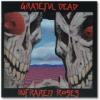Forums
And would you recommend it to anyone else?
This topic by suggestion...
and yet another...
It seems like one just leads to the next! I'm considering Scully's next but I'm just now putting the wraps on A Long Strange Trip: The Inside History of the Grateful Dead by Dennis McNally. A must read for the serious dead freak. I only found one editing mistake, weird is spelled 'wierd' once about 3/4 of the way though. Forgivable, as I've made that boo boo myself in the past. Now I just remember it as my favorite rhythm guitarist's last name with a 'd' at the end.
Hitchhiker
Im reading "The Hitchhiker's Guide to the Galaxy" by Douglas Adams.
Dead Books, Music Books, Dead Books...
On the Dead front, trying to catch up with this past Spring's releases: "So Many Roads" (Browne), Billy's "Deal", "No Simple Highway" (Richardson). Golden age of Dead history books, eh?! And I'm always trying to fill in the collection with books I've missed over the years. Just got "Growing Up Dead", and Sam Cutler's "Can't Always Get What You Want". Took me a while to find the original Australian printing... Oh- and I loved Richard Loren's "High Notes"!
On the non-Dead music front, I'm enjoying "Stiffed" (Knoedelseder), the investigative story of MCA and their mob influences in the Eighties, and Clive Davis' autobiography. Very little on the Dead in that one, but some. I'm a sucker for record company books, and his is a very good one.
Looking forward to Blair Jackson and David Gans' "This Is All A Dream We Dreamed" and Bill Walton's (!) book this fall.
DeadBase50
It's unwieldy at almost 1K pages. Why not use OCR software to replicate the lists from DeadBase XI and correct them? Marye, I thought you were going to contribute to the forward. I frankly am mildly disappointed with the final product, but not unhappy to support the great folks that put it out. Please don't murder me.
no worries
First I've heard that I was supposed to write a foreword (like that nightmare when it's suddenly the final exam of the class you didn't know you were taking), but it seems like they have quite a few others. A magnum opus for sure. Kudos to Stu et al.
"...resolve itself into a Dew"
I'm reading "The Irish Troubles, a Generation of Violence 1967 - 1992", by J. Bower Bell, and listening to an audiobook 6-volume set of "Edward Gibbon's "Decline and Fall of the Roman Empire". As you can see, I have more fun than most people, but I'll be a grown-up some day.
But seriously, this is serious. I can't shake the feeling we've been sliding into fascism, and that it is speeding up. That is why I'm reading these two books right at this time. 800 FEMA 'containment' camps, military gear sold to our police for riot control. I'm not saying the worst will happen, just saying we're ripe for the pluckin'. Hang on folks. As Bob Dylan says, "Things are going to get interesting right about now."
GD will ease the pain and love for my kids will see me through.
Jerry on Jerry audiobook
It's so great to hear Jerry in his own voice. I love the reflections on Cassady. Especially the 'directing' the bus into the pole part in Chapter 5, pt. 2. I laughed out loud!
P.S. The item might be in your local library if you are lucky!
Dostoyevsky
But now I'm onto to The Insulted and the Humiliated. I don't know why I'm into reading their less famous works. It seems to take me a while to get going, then the book flies to the finish. I just love the way they write. I while back I started Thomas Wolfe's O Lost, the complete text of Look Homeward, Angel, and Kerouac's scroll of On The Road. It just something about how all these guys put words together. Like I can't read much Stephen King, for example. I love his mind, but not his writing...
Stephen King
Now I really like his writing. He's an incredible craftsman. It's his subject matter I have trouble with. I don't like spending time on the dark side.
Shawshank Redemption is one of the most satisfying stories ever, though.
Stephen King
marye, If you like King's writing but not his subject matter, you might enjoy "The Girl Who Loved Tom Gordon" by King. It's a well written psychological horror novel that isn't as dark or gruesome as many of King's novels. I read it a few years ago and gave it to my daughter to read after I read it.
cool, thanks!
I've got huge respect for the guy, but I just don't like the dark stuff. I'm partial to the Different Seasons collection (three of the four of which became movies), which includes Shawshank and The Body (aka Stand By Me), but even that isn't exactly sunny.
different seasons
I've been wanting to read that, especially because The Body and Shawshank. Just been waiting to see it on the cheap at a used bookstore. I went thru a phase where I really wanted to read books of movies I like. The Green Mile for example. Loved the movie. The book, not so much. I, personally, don't think King is that good of a writer, but his stories, they can sometimes really captivate me....
Jorma's book
Just finished Jorma's "Been So Long." I love it a lot. You might also.
What I especially like because it's such a nice change from so many memoir-type things I've read lately that are all about bad-mouthing other people, is that even as he's describing pretty dark stuff, theirs and his, he's quite candid about his own self. Even in the case of people that it's pretty much a cliche to talk bad about, he doesn't do it. There's much heart and sweetness as a result. Also an impressive array of misadventures that make you really happy he's still there to tell the tale. And a nice afterword by Jack.
Gearheads, whether guitars, cars, or bikes, will be in heaven, as he's a bit inclined to geek out over that stuff, but I like that too.
Enlightenment Now by Steven Pinker
I just finished Enlightenment Now: The Case For Reason, Science, Humanism and Progress by Steven Pinker Viking Press
After so many "eons" of the current embarrassment in Washington DC, I needed to read something containing good news. The anthropologist Steven Pinker, has been researching how humanity is progressing over the years since the Enlightenment (1780's AD) It asked the questions What is going badly? and how can we make changes so the bad thing are lessened?
Pinker has some amazing findings. On just about every aspect of life, humans are doing much better than ever before. It may not seem that way living in the current mass media environment, but he will give you the straight history of just what people have been experiencing and doing since the Enlightenment began. And it is a global situation.
Mind you, I do not read light-hearted novels. I like hardcore non-fiction, that is not so easy to read and comprehend. I guess Noam Chomsky warped my perception of reading way back in the '80's. He was the first author I read after I finished all the Hobbits and Universal Hitchhiking and etc stories. Fiction is still great, but I mostly read non-fiction now. I find reality to be vastly weirder than anything imagined. This book was a lot of history. It got dry at times. I trudged thru it.
Mr Pinker has outlined huge improvements to the human experience, but all that can go away rather quickly. What I got out of this book was a way to be confident humanity is making huge leaps forward. Despite all the groups that want to pull us backwards, the mass of humanity is moving rather quickly towards a situation in which things like war, famine, disease and pestilence will disappear from our lives. It is happening. We can look at history and see how far we have come at ending these things. We have to be steadfast in not letting go of the one idea that has been so effective at helping people to live better lives. The universe will not provide nervana quickly. The Enlightenment has afforded us a means to make progress. Don't let the naysayers sway you away from progress. The finish line won't be achieved in our lifetimes. We can evolve over hundreds of generations. It will be better that way.
It was a good book for me to read. It did not give any answers, it only showed how the ideas of the Enlightenment are still alive and solving problems. There is no indication it is not going to lead us astray very far because within rational thought is the constant asking is this the best answer? We make corrections and making these corrections are expected.
Hnett









